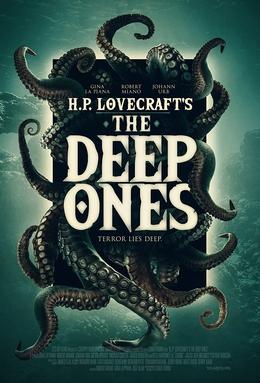There’s an aesthetic to bad movies. And when your production company is Crappy World Films you’ve got to wonder if it’s intentional. Chad Ferrin’s H. P. Lovecraft’s The Deep Ones, which was released in 2020, isn’t a great movie. It is kinda fun, though. I’ve had a weakness for explicit Lovecraft films ever since Stuart Gordon’s very moody Dagon. That film was clearly the inspiration for this one. With the “low” budget of only a million dollars (it feels strange to write that), it nevertheless has a clean cinematography that shows some artistry. The story just isn’t that good. A young couple is seeking a getaway at an oceanfront AirBNB only to discover it’s part of a “gated” community. Their hosts, who are living in the boat down at the marina, keep on stopping in, not leaving them much privacy.

The set-up is very much a Rosemary’s Baby scenario. The community, as the title suggests, worship the Old Ones. They introduce Cthulhu early on, but the young man of the couple has never heard of him (he obviously doesn’t spend much time on the internet). Speaking of the internet, the film makes the point that everyone spends too much time on it, and there’s perhaps some truth to that, but, if you’re streaming the movie you’re also participating. In any case, the community wants women to offer to Dagon—and the monster here is clearly low-budget—so they can bear more children for the Deep Ones. Well, not so much bear children for them as to be pregnant with tentacles that can somehow convert newcomers. Once you’ve been tentacled, it seems, you’re a member of the community.
There is a kind of Lovecraft vibe to the film despite the often wooden acting and throwaway dialog. One thing Lovecraft had learned from Poe was the consistency of mood. It’s here that the movie runs into some trouble. At times it’s a little scary, at times dramatic, but too much of it just feels silly. The case could be made that Lovecraft’s writing tends toward the puerile and there’s some truth to that. It is never silly, however. Sometimes when translated to the screen the outlandishness of Lovecraft’s view of the world comes across as so weird as to be funny. It takes an able director, and a strong writer, to adapt him to cinema successfully. It’s no accident, then, that the movie is dedicated to Stuart Gordon, whose Dagon is still difficult for me to watch, so full of Lovecraft as it is.
